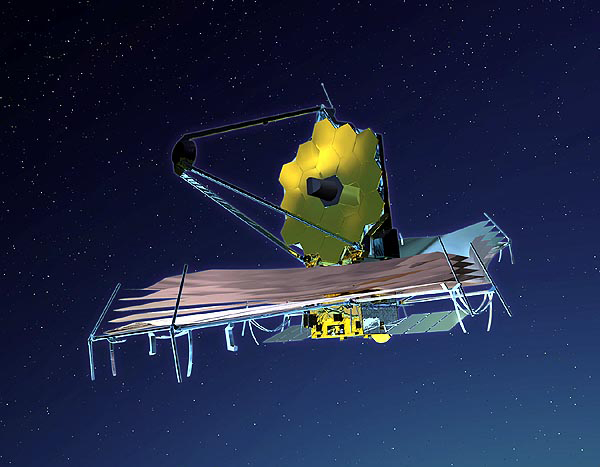Meanwhile, the National Academies is going to issue a report saying space science is under-funded. Now, if we're being honest, no employee, in science or out, has ever said they get enough money and researchers who rely on government funding are no different. If the war on Iraq costs X then it is perfectly fine that they should receive X too.
But, like going to Time magazine and saying you write better than their worst writer so you should have his job, those arguments rarely work outside a small clique of true believers. In the real world, each project is decided on its merits and if scientists want to get more funding, they need to hold themselves and other projects accountable.

Artist's conception of the James Webb Space Telescope. It has been delayed for almost as long as we have been here. Credit: Canadian Space Agency
The Webb telescope, like all telescopes, can 'look back' in time. It takes billions of years for light to reach Earth from the farthest reaches and the closer scientists can see to that magic moment some 13 billion years ago, the 'Big Bang' that created the universe , the better. Webb will be able to see light from about 250-400 million years after the Big Bang whereas the Hubble Space Telescope sees back to only 800 million years.
The concern is that those numbers are pretty esoteric to non-scientists - budgets are already a tricky proposition for something with an unclear benefit so NASA not being able to manage this properly adds fuel to the fiery discourse that they are a bloated, self-perpetuating bureaucracy rather than the descendants of the people who landed on the Moon.
Throwing more money at problems rarely solves them and the US has not been shy about pulling the plug on overpriced budget-busters. The Superconducting Super Collider was a bold vision and no one knew how it could be built but it got funding - and then lost it after it ran years behind with no end in sight. Result: The much less interesting Large Hadron Collider (LHC) had no interest at all from the US, nor will the ILC that will be required to interpret whatever the LHC finds. Short term greed by researchers coupled with lofty promises killed high energy physics in the US for the last 15 years and likely the next 10 before anything new is even considered. An entire generation of researchers were penalized due to hype.
There are no Republicans to blame this time either. Democrats are feeling the pinch from the public about runaway accountability - rather than Iraq it is blank checks for health care and ill-defined stimulus plans - and Sen. Barbara Mikulski, D-Md., told NASA Administrator Charlie Bolden the outside panel was required to make funding for the Webb project continue.
"When Webb bleeds, the rest of space science hemorrhages," said Michael Turner, professor of astronomy and physics at the University of Chicago. Small projects with no big engineering issues simply can't get funding.
The Hubble also suffered its share of black eyes, so engineering setbacks are nothing new. It is easy for scientists and administrators to create a specification and complain if it is not easy to actually build. But at heart it's a 21 foot infrared mirror orbiting 1 million miles from Earth, so not all that exciting to politicians, and if Webb wants to ever see daylight NASA will have to get it back on track - and soon. 'Where do we come from?' question are a luxury and in a difficult economy politicians may decide re-servicing Hubble to last beyond its 2014 date makes more sense during an election year
What NASA might need is not a James Webb telescope but an actual James Webb - a guy who took the job with the understanding that NASA was not a political body in business to stay in business, but out to learn about the stars. With no more computing power than a Commodore 64, Webb's NASA launched 75 missions to space, and then the biggest one of all - landing on the Moon.
More: Watch Webb develop here.




Comments